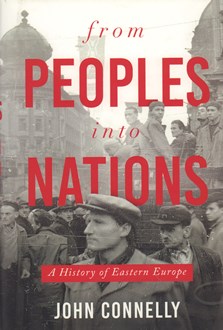From peoples into nations : a history of Eastern Europe / John Connelly.
Yer Numarası
A.IX/5145
ISBN
9780691167121 (hardback)
9780691189185 (e-book)
9780691189185 (e-book)
Dil Kodu
İngilizce
Yazar
Eser Adının Farklı Biçimi
A history of Eastern Europe
Yayın Bilgisi
Princeton, New Jersey ; Oxford : Princeton University Press, ©2020.
Fiziksel Niteleme
viii, 956 sayfa : resim, harita ; 24 cm
İçindekiler Notu
Peoples of Eastern Europe -- Ethnicity on the edge of extinction -- Linguistic nationalism -- Nationality struggles : from idea to movement -- Insurgent nationalism: Serbia and Poland -- Cursed are the peacemakers: 1848 in East Central Europe -- The reform that made the monarchy unreformable : the 1867 compromise -- 1878 Berlin Congress : Europe's new ethno-nation states -- The origins of National Socialism : fin de siecle Hungary and Bohemia -- Liberalism's heirs and enemies : socialism vs. nationalism -- Peasant utopias : villages of yesterday and societies of tomorrow -- 1919 : a new Europe and its old problems -- The failure of national self-determination -- Fascism takes root: Iron Guard and Arrow Cross -- East Europe's anti-fascism -- Hitler's war and its East European enemies -- What Dante did not see: the Holocaust in Eastern Europe -- People's democracy: early postwar Eastern Europe -- Cold War and Stalinism -- Destalinization: Hungary's revolution -- National paths to communism: the 1960s -- 1968 and the Soviet bloc : reform communism -- Real existing socialism: life in the Soviet bloc -- The unraveling of communism -- 1989 -- East Europe explodes : the wars of Yugoslav succession -- Eastern Europe joins Europe.
Özet, vb.
“In the 1780s, the Habsburg monarch Joseph II decreed that henceforth German would be the language of his realm. His intention was to forge a unified state from his vast and disparate possessions, but his action had the opposite effect, catalyzing the emergence of competing nationalisms among his Hungarian, Czech, and other subjects, who feared that their languages and cultures would be lost. In this sweeping narrative history of Eastern Europe since the late eighteenth century, John Connelly connects the stories of the region’s diverse peoples, telling how, at a profound level, they have a shared understanding of the past.
An ancient history of invasion and migration made the region into a cultural landscape of extraordinary variety, a patchwork in which Slovaks, Bosnians, and countless others live shoulder to shoulder and where calls for national autonomy often have had bloody effects among the interwoven ethnicities. Connelly traces the rise of nationalism in Polish, Austro-Hungarian, and Ottoman lands; the creation of new states after the First World War and their later absorption by the Nazi Reich and the Soviet Bloc; the reemergence of democracy and separatist movements after the collapse of communism; and the recent surge of populist politics throughout the region.
Because of this common experience of upheaval, East Europeans are people with an acute feeling for the precariousness of history: they know that nations are not eternal, but come and go; sometimes they disappear. From Peoples into Nations tells their story“ -- Yayıncı.


